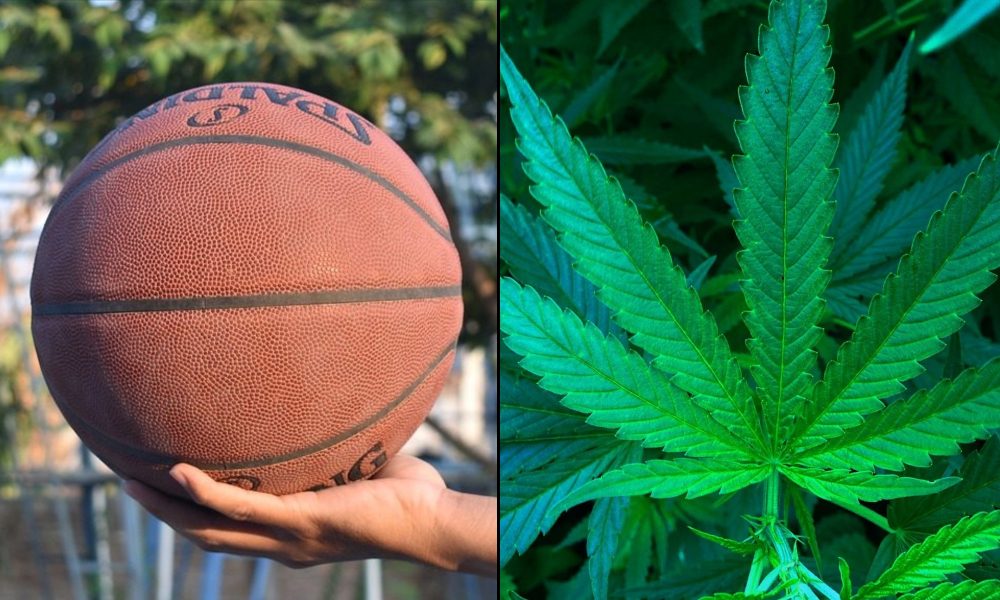Sports
States That Legalize Marijuana See Enhanced College Basketball Recruitment, Study Finds – Marijuana Moment

Florida GOP Senator Files Medical Marijuana Industry Tax Relief Bill As Federal 280E Workaround
70 Percent Of Top Capitol Hill Staff Doubt Any Marijuana Reform Will Pass This Congress, Banking Or Otherwise, Newly Released Survey Shows
Wisconsin Could ‘Potentially’ Legalize Medical Marijuana This Session, Top GOP Senator Says As Governor Pushes Broader Reform
Top Federal Health Official And Former White House Drug Czar Brief Congress On Kratom As Advocates Push For Bipartisan Reform Bill
New Jersey Awards $5.2 Million In Marijuana Revenue To Hospital-Based Violence Intervention Programs
States That Legalize Marijuana See Enhanced College Basketball Recruitment, Study Finds
State Marijuana Legalization Has ‘Not Really Impacted’ Teen Use, Federal Official Says As New Youth Survey Shows Stable Trends
States That Ban Marijuana May ‘Unintentionally Promote’ Unregulated Delta-8 THC Products, Federally Funded Study Finds
LSD And Psilocybin Could Be Powerful Treatments For Pain—Without Opioids’ Dwindling Effects Over Time, Study Says
Psilocybin’s ‘Efficacy And Safety’ For Bipolar II Depression Demonstrated By American Medical Association Study
States That Legalize Marijuana See Enhanced College Basketball Recruitment, Study Finds
Carnival Cruise Lines Denies That Anti-Marijuana Enforcement Measures Are Meant To Boost Alcohol Sales On Ships
SXSW Announces 2024 Lineup, Leaning Into Psychedelics While Nixing Cannabis Track
Jimmy Kimmel Proclaims October 20—Snoop Dogg’s Birthday And Midpoint To 4/20—As New Marijuana Holiday Called ‘DoggFather’s Day’
NCAA Panel Formally Recommends Removing Marijuana From Banned Substances List For College Athletes
Marijuana Will Gain Millions Of Consumers Over Alcohol, With Sales Hitting $37 Billion By 2027, Investment Bank Projects
National Marijuana Legalization Would Grow Tax Revenue To $8.5 Billion For All States, Think Tank Estimates In New Taxation ‘Blueprint’
Maryland Adult-Use Marijuana Sales Set Another New Monthly Record In November
Connecticut Sales Of Legal Marijuana Set New Monthly Record In November
Arizona’s Legal Marijuana Sales Passed $1 Billion Mark For 2023 In September, New Data Shows
Top Federal Health Official And Former White House Drug Czar Brief Congress On Kratom As Advocates Push For Bipartisan Reform Bill
DNC Chairman Cites Biden’s Mass Marijuana Pardon As Example Of How The President Has Delivered For Black Voters
Colorado Ballot Initiative Would Let Marijuana Consumers Get Concealed Carry Permits For Guns
RFK, Ramaswamy And Williamson Push Psychedelics Reform On Presidential Campaign Trail
Pennsylvania Marijuana Legalization Hearing Features Testimony From Expert On Regulatory Systems In Other States
DOJ & cannabis biz agree on lawsuit extension (Newsletter: December 19, 2023)
Pennsylvania gov signs cannabis bill (Newsletter: December 18, 2023)
GA officials plan DEA cannabis threat pushback (Newsletter: December 15, 2023)
Cannabis rescheduling’s impact on states could be huge (Newsletter: December 14, 2023)
CA removes cannabis question from police job apps (Newsletter: December 13, 2023)
Published
on
By
Marijuana legalization is linked to significantly better recruitment for college basketball and worse outcomes for football teams, according to a new study.
Researchers at Georgia College & State University and Kennesaw State University said there are numerous factors that affect recruitment trends in college athletic leagues, and so they tested the relationship between adult-use cannabis policies and talent acquisition.
The study, published in the Journal of Sports Economics last week, looked at recruiting data from 2003 to 2019 and applied difference-in-difference models, finding that marijuana legalization appears to be an “important, but complex, driver of college sports recruiting” that should be taken into consideration by National Collegiate Athletic Association (NCAA) leagues.
For college basketball, teams located in a state where cannabis is legal see an average 3.7-slot improvement in recruiting rankings.
“Residing in a state with legal recreational marijuana use is found to improve a college basketball program’s recruiting ranking.”
“In absolute terms, being located in a state with legal marijuana exerts an effect on recruiting that is 50 percent as strong as having a new coach,” the study says.
Conversely, cannabis legalization is associated with poorer recruitment outcomes when it comes to football teams, with recruitment rankings an average 2.9 slots worse for colleges located in legal states compared to “otherwise similar institutions” that haven’t legalized for adult-use.
“Colleges in states with legal recreational marijuana use can expect improved recruiting outcomes in basketball, but reduced recruiting prowess in football,” the authors said. “In both cases, the effects are large, suggesting that interested parties (e.g., coaches, administrators, and fans) of other NCAA sports should consider marijuana laws a potential driver of recruiting effects.”
Because the study didn’t rely on survey data from individual athletes, the authors said any explanations that could be derived from their findings are “merely conjecture,” though they offered a few hypotheses nonetheless.
One theory is that the difference in recruitment between football and basketball could be related to the marijuana policies of national leagues (i.e. the NFL and NBA). While both historically penalized players over cannabis before adoption reforms more recently, “the adverse financial effects of positive tests were generally larger in the NFL.” Also, unlike the NBA, the NFL’s policy meant “one positive test could end a marginal NFL player’s career,” potentially influencing why college football players would be more wary of marijuana.
“Given the NBA’s relatively lax stance on marijuana, it seems feasible that NBA-hopeful prospects may be more willing to use the drug in college, while future NFL players have a greater incentive to steer clear of weed,” the study says. “This could explain why basketball recruiting is improved for colleges in a state with legal recreational marijuana.”
However, beginning in 2020, “both leagues adjusted their policies,” it notes.
Earlier this year, for example, NBA and its players union signed a collective bargaining agreement that removes marijuana from the league’s banned substances list and lays out rules allowing players to invest in and promote cannabis brands—with certain exceptions.
NFL’s drug testing policy also changed demonstrably in 2020 as part of a collective bargaining agreement. It stipulates that players will not face the possibility of being suspended from games over positive tests for any drug—not just marijuana.
These marijuana policy changes have affected numerous professional sports leagues amid the state legalization movement. That includes the NCAA itself.
In September, the NCAA Committee on Competitive Safeguards and Medical Aspects of Sports formally recommended that its divisional governing bodies remove marijuana from the list of banned substances list for college athletes.
If the reform is adopted, it would build on a policy change that NCAA enacted last year to increase the THC threshold that constitutes a positive test for college athletes from 35 to 150 nanograms per milliliter, aligning the NCAA’s rules with that of the World Anti-Doping Agency (WADA).
The new study, meanwhile, also suggested that the disparate impact of legalization on college football and basketball recruitment could also be related to cultural differences. That is, it’s possible “the basketball community is generally accepting of marijuana use.”
“Our findings and the NBA’s lax policies may both be manifestations of a culture that deems marijuana,” it says, adding that if past statements about the ubiquity of cannabis use among the league’s executives are true, “college recruits may feel empowered to use the drug in college and may choose to attend a college in a state where recreational use is permitted.”
“While these explanations are feasible, more research is needed,” the authors said.
In any case, they said the results “have predictive powers regarding the future of college athletics,” as multiple states have enacted legalization since the end of the study period in 2019, including New Jersey, New York, New Mexico, Virginia and Connecticut.
“Based on our results, we can anticipate that colleges in these states will enjoy improved basketball recruiting and on-court performance in the coming years, relative to their peers,” the study says. “These same colleges can expect adverse recruiting effects in football, leading to worsened on-field performance in future seasons. However, many universities in these states do not have football programs, but possess well-established basketball programs.”
Meanwhile, in other sports-related drug policy developments, Nevada sports regulators voted earlier this year to send a proposed regulatory amendment to the governor that would formally protect athletes from being penalized over using or possessing marijuana in compliance with state law.
UFC announced in 2021 that they would no longer be punishing fighters over positive marijuana tests.
The New York Media Softball League (NYMSL)—which has teams representing The Wall Street Journal, High Times and BuzzFeed among its ranks—announced in July that it was launching a sponsorship deal with a Kentucky-based CBD company.
The idea behind the collaboration was inspired by moves by Major League Baseball (MLB) and certain teams like the Kansas City Royals and Chicago Cubs that have also recently partnered with CBD businesses.
MLB itself announced its league-wide partnership with a popular CBD brand last year. Charlotte’s Web Holdings, one of the most recognizable hemp-derived CBD companies in the country, signed the deal with league to become the “Official CBD of MLB.”
While advocates have welcomed these changes, there’s been criticism of the World Anti-Doping Agency (WADA) over its ongoing cannabis ban. A panel within the agency said in an editorial in August that marijuana use by athletes violates the “spirit of sport,” making them unfit role models whose potential impairment could put others at risk.
Advocates strongly urged WADA to enact a reform after U.S. runner Sha’Carri Richardson was suspended from participating in Olympics events due to a positive THC test in 2021.
Following that suspension, the U.S. Anti-Doping Agency (USADA) said that the international rules on marijuana “must change,” the White House and President Joe Biden himself signaled that it was time for new policies and congressional lawmakers amplified that message.
RFK, Ramaswamy And Williamson Push Psychedelics Reform On Presidential Campaign Trail
Photo courtesy of Martin Alonso.
Carnival Cruise Lines Denies That Anti-Marijuana Enforcement Measures Are Meant To Boost Alcohol Sales On Ships
Kyle Jaeger is Marijuana Moment’s Sacramento-based managing editor. His work has also appeared in High Times, VICE and attn.
Florida GOP Senator Files Medical Marijuana Industry Tax Relief Bill As Federal 280E Workaround
70 Percent Of Top Capitol Hill Staff Doubt Any Marijuana Reform Will Pass This Congress, Banking Or Otherwise, Newly Released Survey Shows
Wisconsin Could ‘Potentially’ Legalize Medical Marijuana This Session, Top GOP Senator Says As Governor Pushes Broader Reform
Top Federal Health Official And Former White House Drug Czar Brief Congress On Kratom As Advocates Push For Bipartisan Reform Bill
New Jersey Awards $5.2 Million In Marijuana Revenue To Hospital-Based Violence Intervention Programs
Iowa School Employee Busted With Three Pounds Of Marijuana Is Entitled To Unemployment Benefits, Judge Rules
All the cannabis news you need, all in one place. Copyright © 2017-2024 Marijuana Moment LLC ® and Tom Angell









